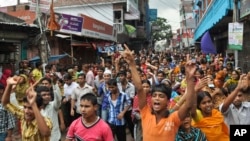NEW DELHI, INDIA —
In Bangladesh, days of street protests by garment workers demanding higher wages have shut scores of factories. The world’s second largest apparel exporter has been in the spotlight for unsafe working conditions and low wages.
Police fired rubber bullets and used batons and tear gas to disperse hundreds of garment workers who blocked highways and disrupted traffic Wednesday morning in two industrial hubs on the outskirts of Dhaka.
Fearing violence, about 100 garment factories shut down. Several have been shuttered since the street protests began five days ago. Dozens of people have been injured.
Negotiations have failed to end the demonstrations. Garment industry workers want the monthly minimum wage to be more than doubled - from $38 at present to $100. They have turned down an offer of a 20 percent wage hike, calling it “inhuman and humiliating.”
“The Wage Board is back and forth and they are discussing. There is no final word from the government, but workers literally not accepting," said Kalpona Akter, who heads the Bangladesh Center for Workers Solidarity in Dhaka. "The workers are saying it is too low and they cannot live with this money. Living cost is so high. It is so difficult for workers to live with this money,” said Akter.
Factory owners said they could not afford a steep pay hike because global clothing companies were not willing to pay higher prices at a time when Western countries were facing a downturn.
But labor leader Akter disagreed.
“I definitely not agree with that. I think it is kind of country’s strategy to keep wages low to compete with international market. The thing is that factory owners definitely get enough to give decent wage to the workers, but it is kind of that profit greed which is main resistance I would say,” said Akter.
Workers were last given a pay hike three years ago - also after prolonged protests. Labor leaders said since then high inflation had cut into workers’ salaries causing them great hardship.
Wages in Bangladesh’s garment industry are the lowest in the world - nearly half of those in Cambodia, another low cost garment manufacturing center in Asia.
Although the industry is thriving, it is under scrutiny for the poor working conditions for its more than three million employees - mostly women.
The labor unrest comes five months after a building housing garment factories collapsed killing 1,100 workers and turning the spotlight on unsafe factories which churn out clothes for Western retailers.
Bangladesh’s apparel exports are worth $20 billion - the second highest in the world after China.
Police fired rubber bullets and used batons and tear gas to disperse hundreds of garment workers who blocked highways and disrupted traffic Wednesday morning in two industrial hubs on the outskirts of Dhaka.
Fearing violence, about 100 garment factories shut down. Several have been shuttered since the street protests began five days ago. Dozens of people have been injured.
Negotiations have failed to end the demonstrations. Garment industry workers want the monthly minimum wage to be more than doubled - from $38 at present to $100. They have turned down an offer of a 20 percent wage hike, calling it “inhuman and humiliating.”
“The Wage Board is back and forth and they are discussing. There is no final word from the government, but workers literally not accepting," said Kalpona Akter, who heads the Bangladesh Center for Workers Solidarity in Dhaka. "The workers are saying it is too low and they cannot live with this money. Living cost is so high. It is so difficult for workers to live with this money,” said Akter.
Factory owners said they could not afford a steep pay hike because global clothing companies were not willing to pay higher prices at a time when Western countries were facing a downturn.
But labor leader Akter disagreed.
“I definitely not agree with that. I think it is kind of country’s strategy to keep wages low to compete with international market. The thing is that factory owners definitely get enough to give decent wage to the workers, but it is kind of that profit greed which is main resistance I would say,” said Akter.
Workers were last given a pay hike three years ago - also after prolonged protests. Labor leaders said since then high inflation had cut into workers’ salaries causing them great hardship.
Wages in Bangladesh’s garment industry are the lowest in the world - nearly half of those in Cambodia, another low cost garment manufacturing center in Asia.
Although the industry is thriving, it is under scrutiny for the poor working conditions for its more than three million employees - mostly women.
The labor unrest comes five months after a building housing garment factories collapsed killing 1,100 workers and turning the spotlight on unsafe factories which churn out clothes for Western retailers.
Bangladesh’s apparel exports are worth $20 billion - the second highest in the world after China.




